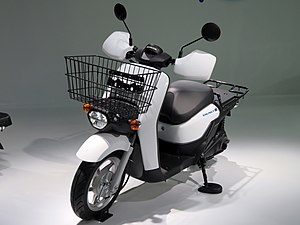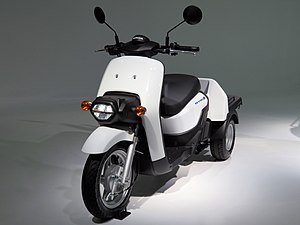Honda Mobile Power Pack
The Honda Mobile Power Pack (MPP) is an exchangeable lithium-ion battery manufactured by Honda and Panasonic, intended to store power for personal mobility vehicles, including electric motorcycles and scooters. It was introduced at the 2017 Tokyo Auto Show to power the Honda PCX Electric and has since been adopted by the Swappable Battery Motorcycle Consortium formed by many motorcycle and scooter manufacturers, including Honda, Kawasaki, Suzuki, and Yamaha.
History
[edit]Prior electric scooters previously marketed by Honda, including the CUV-ES (1994) and EV-neo (2009) used a high-voltage traction battery integral to the vehicle; in contrast, the 2018 PCX Electric was based on the conventional PCX scooter, equipped with an electric traction motor and removable storage battery which was intended to enable more rapid recharging to support realistic uses through battery swapping.[1]: 50 The cells are manufactured by Panasonic.[2]
Honda, Kawasaki, Suzuki, and Yamaha established the Swappable Battery Consortium for Electric Motorcycles in April 2019 and finalized their specification for a swappable battery in 2021;[3] KTM and Piaggio also joined the consortium in March 2021.[4]
Specifications
[edit]The MPP operates at a voltage of 50.4 V with a minimum capacity of 20.8 A-h (1,052 W-h) as introduced in 2017. It has an overall volume of 7.1 L (0.25 cu ft) and weighs a maximum of 10.9 kg (24 lb), with dimensions (H×W×D) of 296 mm × 178 mm × 155 mm (11.7 in × 7.0 in × 6.1 in).[1]: Table 3 It is an air-cooled design with a maximum discharge rate of 50 A or 2.5 kW (3.4 hp); at an ambient temperature of 40 °C (104 °F), the battery temperature rise is limited to 53 °C (127 °F) after 10 minutes at 2.5 kW, below the upper limit of 60 °C (140 °F).[1]: 57–58
In 2021, an updated Mobile Power Pack e: (DM5026Z) was released with an increased maximum storage capacity of 26.1 A-h (1,314 W-h at 50.26 V).[5] When the Honda EM1 e: was released in 2023, capacity had increased again to 29.4 A-h (1,475 W-h).[6]
Applications
[edit]Honda envision that battery swapping stations built around charging banks of MPPs can be used to store energy when production from renewable sources is high and electric demand is low.[5] Initial trials of battery swapping stations were held in Indonesia and the Philippines.[2] For the trials in Indonesia, Honda, Panasonic, and Pacific Consultants, Ltd. established a joint venture.[7] Trials were expanded in 2021, using MPPs to power local three-wheeled auto rickshaws in India.[8] In 2022, the first battery swapping station in Tokyo began operation.[9]
Vehicles using MPP
[edit]- Honda PCX Electric (2018)[10]
- Honda Benly e: (2019)[11]
- Honda Gyro e: (2021)[12] & Gyro Canopy e: (2021)[13]
- Honda EM1 e: (2023)[14]
-
Honda Benly e:
-
Honda Gyro e:
References
[edit]- ^ a b c Mitsukawa, Makoto; Ichikawa, Hiroki; Okubo, Katsuyuki; Kato, Takaaki; Takahashi, Yasushi; Shigemizu, Nobuo; Okubo, Katsunori. "Development of the PCX Electric". Honda R&D Technical Review. 31 (1): 49–62. Retrieved 16 August 2023.
- ^ a b Ilagan, Aris (February 18, 2019). "Review: Honda PCX Electric". Top Gear Philippines. Retrieved 16 August 2023.
- ^ "Agreement Reached to Standardize Swappable Batteries for Electric Motorcycles" (Press release). Honda Global. March 26, 2021. Retrieved 16 August 2023.
- ^ Purvis, Ben (March 2, 2021). "Honda, KTM, Piaggio, and Yamaha Form Electric Battery Consortium". Cycle World. Retrieved 16 August 2023.
- ^ a b "Honda Introduces Initiatives for the Utilization of Honda Mobile Power Pack, portable and swappable batteries" (Press release). Honda Global. October 29, 2021. Retrieved 16 August 2023.
- ^ "23YM HONDA EM1 e:" (Press release). Honda European Media Newsroom. 12 May 2023. Retrieved 16 August 2023.
- ^ "Honda and Panasonic to begin experiment on battery sharing using detachable mobile batteries and electric motorcycles in Indonesia". Green Car Congress. 13 July 2018. Retrieved 17 August 2023.
- ^ Punsalang, Enrico (June 2, 2021). "Honda Testing Mobile Power Pack For Commercial Use In India". Ride Apart. Retrieved 17 August 2023.
- ^ Shakir, Umar (October 28, 2022). "Honda sets up the first motorcycle battery swap station for its mobile power packs". The Verge. Retrieved 17 August 2023.
- ^ "電動二輪車「PCX ELECTRIC」のリース販売を開始" [Started leasing electric scooter 'PCX ELECTRIC'] (Press release) (in Japanese). Honda Japan. November 29, 2018. Retrieved 17 August 2023.
- ^ "ビジネス用電動二輪車「BENLY e:」シリーズを発表" [Announcing the 'BENLY e:' series of electric mopeds for business use] (Press release) (in Japanese). Honda Japan. December 19, 2019. Retrieved 17 August 2023.
- ^ "Honda e: ビジネスバイク シリーズ第二弾 ビジネス用電動三輪スクーター「ジャイロ e:」を発売" [Honda e: 2nd release in the business bike series | Electric three-wheeled scooter for business use 'Gyro e:'] (Press release) (in Japanese). Honda Japan. March 18, 2021. Retrieved 17 August 2023.
- ^ "Honda e: ビジネスバイク シリーズ第三弾 新型交換式バッテリーを採用した屋根付き電動三輪スクーター 「GYRO CANOPY e:」を発売" [Honda e: 3rd release in the business bike series | Electric three-wheeled scooter with roof adopting new replaceable battery 'Gyro Canopy e:'] (Press release) (in Japanese). Honda Japan. October 28, 2021. Retrieved 17 August 2023.
- ^ "原付一種の電動二輪パーソナルコミューター「EM1 e:」を発売" [Honda releases the EM1 e:, a personal electric scooter for commuting] (Press release) (in Japanese). Honda Japan. May 19, 2023. Retrieved 17 August 2023.
External links
[edit]- "Honda Mobile Power Pack World creates a variety of uses for renewable energy" (PDF). Honda. October 2017.
- "Honda Mobile Power Pack e:". Honda (in Japanese).


